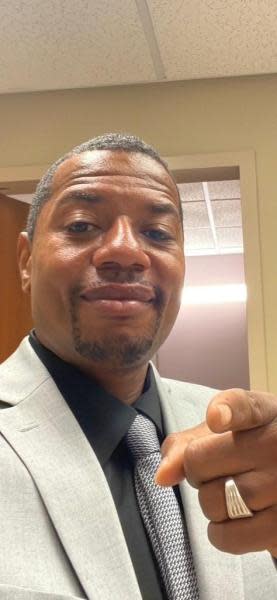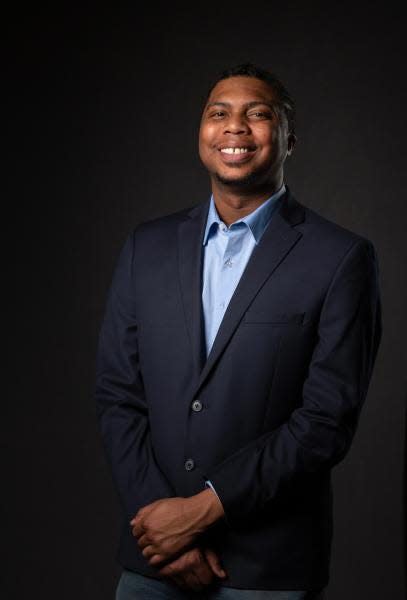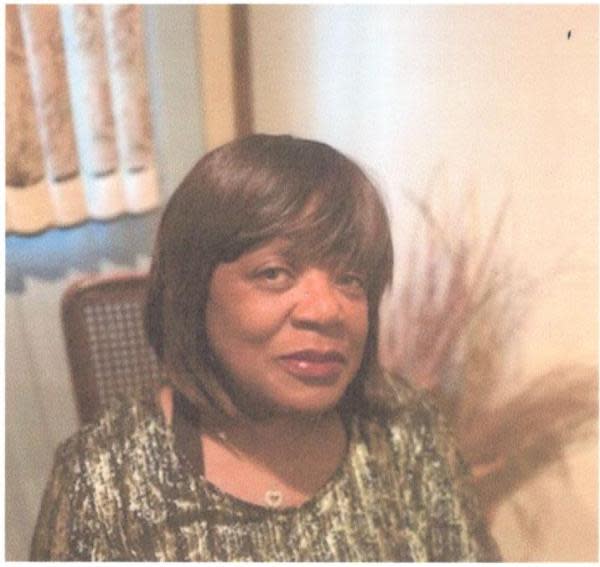South Bend Dist. 2 hopefuls talk crime, economic development and poverty ahead of primary
The Tribune is partnering with the League of Women Voters of the South Bend Area and the American Democracy Project of Indiana University South Bend to publish candidates' answers to questions on the issues. The League, with local help from the ADP, operates Vote411.org, a website with information about the candidates and their positions on key issues.
The Tribune has agreed to run candidate answers unedited, meaning any spelling, typographical or grammatical errors are the candidates' own. The Tribune is publishing only some of the questions from a selection of contested races. Additional questions and answers, including from candidates who have no opponent in the primary, are available at Vote411.org.
Early voting for Indiana's May 2 municipal primary election began last week. To vote early, either fill out an application for a mail ballot at https://indianavoters.in.gov/MVPHome/PrintDocuments or vote in person. In St. Joseph County, there are two early-voting locations: the County-City Building, 227 W. Jefferson Blvd. in South Bend; or the Mishawaka County Services Building, 219 Lincoln Way W. in Mishawaka. Voters must present a valid government-issued photo ID.
Early-voting hours at both locations are 8 a.m. to 4:30 p.m. Mondays through Fridays (except May 1, when voting closes at noon.); 8 a.m. to 4 p.m. on Saturdays April 22 and 29; 1 to 4 p.m. Sunday, April 30.

Incumbent South Bend Common Council District 2 member Henry Davis is not seeking re-election and is instead challenging Mayor James Mueller in the Democratic mayoral primary. Democrats Jorden Giger and Ophelia Gooden-Rodgers seek to replace him on the ballot. The winner of that May 2 primary will face Republican Roosevelt Stewart in the fall. Because Stewart is unopposed in the primary, his answers don't appear today but will in the fall.
Jorden Giger

Occupation: Consultant
Email: team@jordengigerforsouthbend.com
Website: jordengigerforsouthbend.com
Campaign phone: 574-334-7372
Ophelia Gooden-Rodgers

Occupation: South Bend schools CSA
Email: opheliagooden97@gmail.com
Website: qr.page/g/BFfbCFguNJ
Campaign phone: 574-232-7836
In your view, what is most unique about the district you seek to represent? As a council member, how will you promote your district's needs while working with other council members?
Giger: Economic inequality is the foremost issue facing District 2. We have two of the poorest neighborhoods in the city. “The Lakeside”/LaSalle Park and Kennedy Park neighborhoods have homeownership rates of 42% and 37%, respectively. The average incomes in each neighborhood is $13,369 and $19,511. The unemployment rates are 23% for The Lakeside and 14% for Kennedy Park. Thanks to the leadership of Councilman Henry Davis, Jr., who is endorsing me as his successor, we have made tremendous progress around increasing investment into the district. We, however, lack representation at the At-Large level. The lack of representation at this level is one of our biggest issues. Rachel Tomas Morgan has not visited our neighborhood association in three years. I support targeted investment.
Gooden-Rodgers: In my view it is full of diversity. As a council member, I will get out and go to work myself if it need to be cleaned up I have cleaned up the highways with my union. the second district has lovely parks: LaSalle Park, The MLK dream center , (TBC) The Kroc center, Pulaski Park to name a few wonderful venues. They are unique and reflect the diversity of the district. We have ,a variety of neighborhoods, and all are welcome. I will regularly attend neighborhood meetings to learn and listen about needs. I will meet with city departments and other council members to share those needs and find solutions.
What is the best way to curb crime? Should we increase police staffing, technology and budgets? Or should we redirect resources away from policing? Explain your reasoning.
Giger: While police staffing numbers have increased at record levels in the city, violent crimes have reached record rates as well. Research demonstrates that increased police surveillance does not reduce crime. I have supported and proposed legislation nationally and locally to reimagine public safety and health. We must invest in Peacemaker Fellowships because the Group Violence Intervention (GVI) program is a failure and at-risk youth do not trust its leadership. Progressive cities are experiencing reductions in crime by deploying unarmed public safety workers. We should look to Ithaca, New York and Newark, New Jersey as models. We need to place mobile mental health crisis units in our fire stations so they are accessible to residents. We do not need another Dante Kittrell or Eric Logan case. Black men deserve to grow old.
Gooden-Rodgers: Frist, everyone should stop being reactive and be more reflective. Instead of taking away we need to add ongoing mental health and diversity training for police officers. Social Work professionals should be included in nontraditional policing situations. We need a safe house for young people to have a place to be and receive services, counseling, food, shelter, clothing, ect.
The South Bend Redevelopment Commission is responsible for much of the public money going toward private investment. What should be required of companies seeking financial incentives and investments and what power should the city have to reclaim tax money if a company does not fulfill its promises?
Giger: We must restructure our tax abatement ordinance and ensure compliance for those who receive such benefits. Mayor James Mueller’s Department of Community Investment is harming our city, school system and county. The former County Assessor explained years ago that the county’s budget is so tight because South Bend gives away too many tax breaks. These tax breaks are going to elites, many of whom are Mayor James Mueller or Pete Buttigieg’s donors. I will introduce amendments to the tax abatement ordinance upon assuming office. Tax abatements must be tied to community benefits, such as: greening businesses; planting trees; providing jobs to low-income communities; creating jobs-training programs for youth; and hiring unionized labor or contractors of color. If companies do not fulfill their promises they will be penalized accordingly.
Gooden-Rodgers: Use unions to do the work, hire people of color and women, when possible, use local colleges and university for training incentives for the workforce, when possible have childcare available, stay a required period of time, i.e. ten years. if violated, all benefits must be returned or reimbursed. It time to stop giving out money w/o people being held accountable.
What can the city do to address the issues of children and adults living in poverty and/or homelessness in the community?
Giger: I support Councilman Henry Davis, Jr.’s plan to invest $12 million into the South Bend Housing Authority. The Housing Authority is the largest affordable housing provider in the City of South Bend. We need roughly 6,000 more units of affordable housing. So far, the “core governing team”, as named by Rachel Tomas Morgan, has supported proposals for a few hundred units; most of which are not built. This imaginative housing does not meet the need. The Council needs to work with the Housing Authority to create a robust affordable housing plan so we can house seniors, youth, LGBTQ+ persons and working residents and families who are being priced out of South Bend. By doing so, we can access federal funding to increase our affordable and public housing portfolio. We need housing for all, not just for the rich and well-connected.
Gooden-Rodgers: Social services and children welfare should be more readily available. They should be more available in schools which exists in every neighborhood. More available assistance for public housing. More support for hotels 4 now &housing first programs. Public gardens.
Many recognize a disparity in economic growth in different parts of the city. What steps will you take to ensure economic growth and development is more widely distributed across the entire community?
Giger: I co-authored the Reparatory Justice Resolution with Councilman Henry Davis, Jr. The city’s so-called financial empowerment plan is insulting. It focuses on individual behaviors instead of systemic violence carried out against Black communities in South Bend for over a century. I will push for the city to back business and community development projects and mortgages to increase homeownership in Black communities using available city reserves and civil funds. According to a 2021 Department of Administration & Finance bank reconciliation report, the city holds $200 million dollars in an investment account at 1st Source Bank. I support the socialization of these dollars. 1st Source Bank and the city discriminated against Black communities so both must pay for their racist practices. I support socialism for the working class, not the elites.
Gooden-Rodgers: Establish a resolution that will agree that a fair distribution is needed. Get other members to work with me in the 2nd district to share the wealth throughout the city. Follow through on Kennedy Park plan that includes a pool. Continue with street improvements. If an industry goes out of business clean it up in a timely manner. Technology, public safety, housing, & environment are obvious.
This article originally appeared on South Bend Tribune: South Bend Dist. 2 hopefuls talk issues facing west side, city as whole
